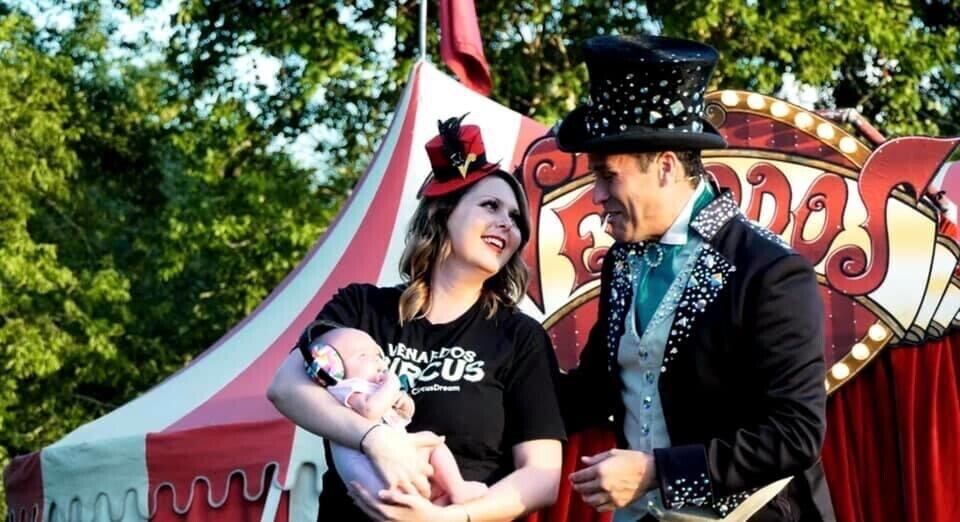Kevin Venardos is a dreamer.
It's big dreams that led him to try out for an unconventional job after college: circus ringmaster. It's those same dreams that took him all over the country leading that circus after he nailed the audition. And it's dreaming that led to him launching his own live show, Venardos Circus, in 2013.
"The cool thing about making dreams is actually making them come true," Kevin Venardos said with a laugh.
He started small. Just one man and one tent at one county fair.
"We've always been the little circus that could," he said, touting the circus' humble beginnings.
Things have grown up a bit since then. He planned to travel across the country this year, holding dozens of shows in nearly 30 cities. That is, until coronavirus grounded the troupe in Texas and put the dream on hold, leaving Venardos and his circus performers unemployed.
"I told everyone, 'We've got to go home.' I did the best I could to take care of everybody," he remembered about the days leading up to stay-at-home orders sweeping across the nation.

Venardos employed about 21 performers and other staff as independent contractors. His status as a small business owner made him eligible for a Paycheck Protection Program loan. The economic reality of hiring performers means those funds don't stretch to cover the people who work for him.
"I have not gotten a PPP loan for others. I was able to claim myself as an individual employee," he recounted. "It was meant so that the 1099 contractors are supposed to be able to apply on their own for a PPP loan and that is why they haven't been eligible under the umbrella of an employer who contracts them."
Still, it is frustrating for Venardos in their "unique business" to see his employees struggle through the systems designed to help them.
"I don't think a single one of my gang has been able to acquire a PPP loan on their own."
He, like many Americans, has also attempted to apply for unemployment insurance benefits afforded to him under the federal coronavirus relief law, the CARES Act. But the system in his home state of Florida is so overwhelmed, he has had little success.
"It has gone nowhere," he said.
So, the little circus that could continues to chant "I think I can," taking the big top to the small screen. Venardos is pivoting to an online interface that allows people all over the country and the world to enjoy the spectacle from the comfort of their own homes.
"When all this went down and we got closed up, I started making videos because I wanted to stay in touch with our audience. Let them know that we're alive and we're thinking about them," Venardos explained. "I really strive to forge an emotional connection with the audiences that we meet, wherever that is."
Venardos and the performers with him in Richmond, Texas, attempted their first major livestreamed show in May. They drew 1,200 viewers, many of whom purchased tickets to support the show and the artists.
After paying staff and covering expenses, Venardos donated the proceeds to Feeding America.
Now, he sees the live virtual events and his regular YouTube updates as just another type of performance.
"I think there's no replacement for live entertainment. But in this giant chasm between where we are and wherever we're going to be, I really believe that embracing that digital world is only going to give us a chance to connect with new people who might not have known us before," Venardos said.
He explained the circus is "diversifying our portfolio" by going online.
It makes the economic uncertainty of being a live events producer and performer during a pandemic shutdown a little easier to manage. True to his nature as a dreamer, Venardos is optimistic.
"Right now it's just a livestream. As things unfold, I believe there is opportunity for an outdoor event," he said, imagining a socially-distanced circus.

As Venardos adapts his circus to a new reality, he is also adapting his personal life. Now, he has someone new to share his dreams with, even amid a pandemic.
On March 13, as the country went into lockdown, he and his partner welcomed a baby girl, Andi.
"I'm so grateful that I've gotten to wake up every morning and be with her. Sometimes I don't wake up because I haven't actually gone to sleep at all," he said with a laugh. "I've just been with her. And I'm telling you, it's such a blessing."
It's no surprise then, that his next virtual circus show is on June 21: Father's Day.












